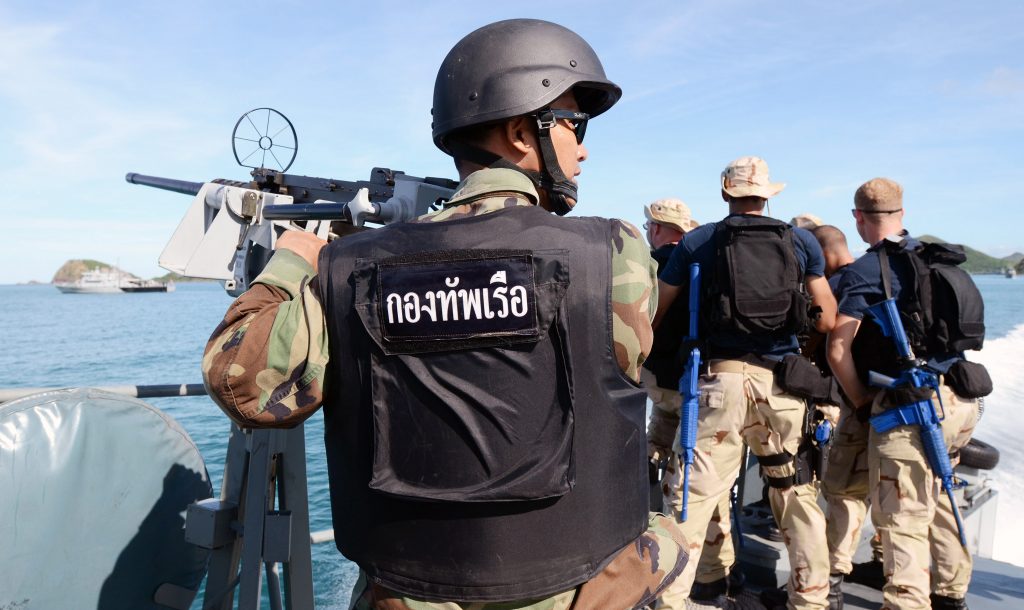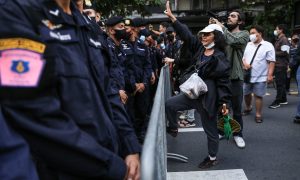A New Mandala article published recently by Paul Chambers, a prominent Thai studies scholar, analysed Thailand’s 2020 annual military reshuffle in an endeavour to monitor the fight between various factions in the Royal Thai Armed Forces over controlling political interests. Although a decision more or less justified considering the Royal Thai Army’s traditional domineering position, the analysis nevertheless focused primarily on the army and not the other branches of the armed forces. This article adds to the work already published by Chambers by narrowing in on the Royal Thai Navy’s incoming leadership and analysing the priorities that this leadership will possibly adopt for the coming year.
On 1 October 2020, then Assistant Commander-in-Chief Chatchai Sriworakhan replaced the outgoing Admiral Luechai Ruddit as the new Commander-in-Chief of the Royal Thai Navy. In this promotion cycle, Admiral Sittiporn Maskasem became the new Deputy Commander-in-Chief, Admiral Songvuth Boonin became the new Assistant Commander-in-Chief, Admiral Theerakul Kanjana became the new Chief-of-Staff, and Admiral Sutthinand Samanrak became the new Commander-in-Chief of the Royal Thai Fleet. It is important to mention that, except for the Commander-in-Chief position, the ranks for all these positions is Admiral (พลเรือเอก) and not Vice Admiral (พลเรือโท), like some media outlets have erroneously chronicled.
This promotion cycle is exceptionally noteworthy. The now former Deputy Commander-in-Chief Admiral Chorchat Krathes was passed over for the Commander-in-Chief opening for a candidate from a lower ranking position—then Assistant Commander-in-Chief Chatchai Sriworakhan. The promotion of Admiral Chatchai over Admiral Chorchat, an individual known for his honesty and professionalism, should be read as Admiral Ruddit wishing to retain some modicum of power in an effort to protect his interests. Simply put, Admiral Chatchai remains in Admiral Ruddit’s shadow.
This view is affirmed by the fact that this is the second year in a row where Admiral Ruddit prevented qualified, opposing, high-ranking officers from being promoted accordingly. Well studied for over a decade now, the promotion of officers across the Royal Thai Armed Forces is more dependent on the candidate’s pre-cadet class than their professional capabilities. Most qualified, high-ranking officers stopped from promoting or placed in marginal roles (like educational posts at the Royal Thai Naval Academy) are in Class 19, viewed within the Navy as more capable than any other classes in the current Admiralty List. In comparison, the former Commander-in-Chief Luechai Ruddit is in Class 18 and the current Commander-in-Chief Chatchai Sriworakhan is in Class 20.
To thicken the plot, Admiral Chatchai Sriworakhan via Admiral Luechai Ruddit is caught up in two major political scandals. Only a week ago, a letter was leaked directly from the Commander-in-Chief’s office, either written by Ruddit or an officer on his staff, “encouraging the Chinese defense agency, [Mr Xu Zhanbing the Vice Administrator of China State Administration Science and Technology and Industry for National Defence (SASTIND)], to put into writing an intent to sell two Yuan-class submarines to Thailand, despite a Cabinet resolution suspending the deal.”
What is particularly interesting is the wording of the letter: it emphasised sending any relevant documents prior to 30 September—the day that Ruddit retires. Although Ruddit claims ardently that this letter is a fake, it is obvious to the public that the emphasis on the deadline is another attempt by military officers to acquire personal monetary interests through an arms deal prior to their retirement.
The other scandal relates to a well-known corruption watchdog, Srisuwan Chanya, Secretary-General of the Association to Protect the Thai Constitution (APTC), who claims that new evidence has emerged to demonstrate that fourteen naval projects violated government regulations and should be classified as corrupt. These projects range from the purchase of a fleet of Marine Patrol Aircraft from South Korea, purchase of Pluto Plus unmanned underwater vehicles from Italy, the construction of the RTN Commander-in-Chief’s riverside guesthouse in Bangkok, and the purchase of amphibious assault vehicles from China.
“Red rim soldiers”: the changing leadership of Thailand’s military in 2020
The palace is working to fill leading army positions with its own faction—the Red Rim Group.
Though not the purpose of this article, it follows to ask whether these two scandals suggest that the Ruddit faction is much more brazen in its standing with relation to the dominant factions of the Royal Thai Army than previous leading factions in the Royal Thai Navy. In other words, does the Navy have more room to operate beyond the powers of the Army than in previous years? In all likelihood, Ruddit took advantage of being viewed by the Privy Council as deeply loyal towards the interests of the monarchy and, therefore, enjoyed more room to manoeuvre politically from the directing hand of the Army than previous leading factions in the Navy. The corruption scandal, however, has derailed his plans to occupy one of the vacant seats on the Privy Council.
The incoming Navy leadership will focus on four priorities for the upcoming year. The first priority is the Eastern Economic Corridor (EEC). In partnership with the Eastern Economic Corridor Office, the Royal Thai Navy plans to attract 45 billion dollars of state, public-private partnerships and private foreign direct investment in its area of responsibilities. Only a few weeks ago, Admiral Chorchat met with the Thai International Public Company Limited at the Royal Thai Navy Headquarters to discuss further proceedings on the U-Tapao MRO Campus project to develop an aerospace hub in the country’s eastern seaboard. This meeting was just preceded by a visit from the prime minister, former General Prayuth Chan-o-cha, accompanied by four ministers from the cabinet, to follow-up on the progress of the construction of a deep sea port at Laem Chabang.
The second priority is the arrival of the Type 071E (Yuzhao-class) landing platform dock ordered from China last year for US$130 million. This vessel is intended to assist its sister ship, the HTMS Angthong—the Navy’s only existing amphibious dock—and accommodate operations with the incoming Type S26T (Yuan-class) submarines. Yet the question remains whether its clumsy size of 22,000 tons is actually suitable to act as a submarine tender, a type of depot ship that supplies and supports submarines. The landing dock purchase was also one of the fourteen projects classified as lacking transparency and corrupt by Srisuwan Chanya.
Like with the public outrage over the approval of the budget for the submarines by Parliament subcommittee just under a month ago, it is likely that in the coming weeks the general public will bind together a dubious naval purchase with interruptions to the democratisation process and slow economic recovery in the post-Covid crisis period in its evaluations of the incumbent government.
The third priority is to ensure that the payment for the second and third submarines is sent to China even against the public weight of opinion. Over a three decade period now, the Navy has utilised a plethora of justifications for the purchase of submarines, the most recent being deterrence against Malaysian and Myanmarese maritime expansionism into the Gulf of Thailand and Andaman Sea, respectively. In another article, these arguments are shown to hold very little weight. The newly acquired submarines will most likely above all perform normal police operations. Like with the HTMS Chakri Naruebet helicopter carrier previously, the Royal Thai Navy’s purchase of the three submarines is the result of a strategic and organisational culture that conflates security with “prestige”.
The final priority is somewhat more controversial. In certain circles, even though the new Commander-in-Chief has stated otherwise, there have been claims that a potential government coup will take place unless the economic situation improves considerably and the government takes a firmer stand against anti-royalist protestors. The newest emergency decree and violent crackdowns suspected to arrive over the coming weeks should be interpreted as a move by Prime Minister Prayuth, in fear of personal repercussions, to answer the call from monarchy supporters. Under that assumption, the Ruddit faction at the head of the Navy’s leadership will seek to better position itself amid this pre-coup environment in an effort to ensure that the controversial contracts for large naval assets from China are part of the package for any tacit approval.
With the promotion of Admiral Chatchai over Admiral Chorchat, the Royal Thai Navy’s 2020 annual promotion cycle has shown that the Ruddit faction continues to maintain domineering power and control. Yet this faction is currently at a juncture due to two political corruption scandals. In the face of surging public pressure, these scandals will seriously hinder the faction’s ability to carry out the four priorities it will likely set out for the upcoming year.
 Facebook
Facebook  Twitter
Twitter  Soundcloud
Soundcloud  Youtube
Youtube  Rss
Rss 



